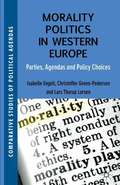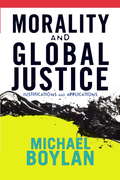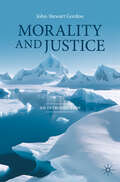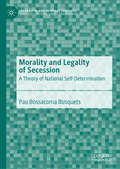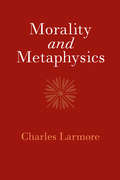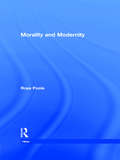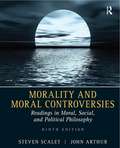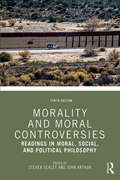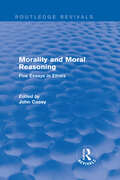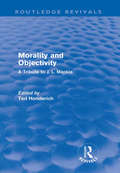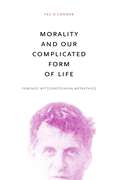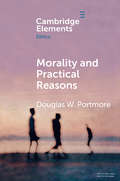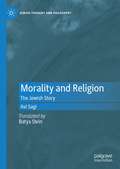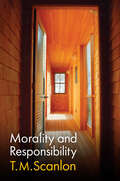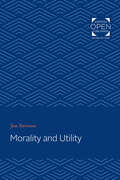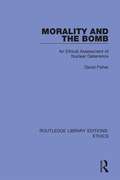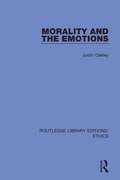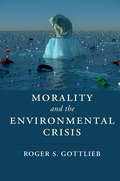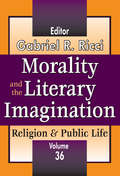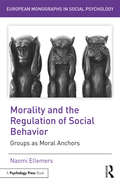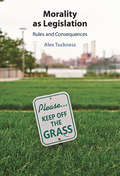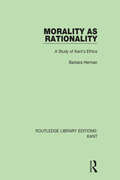- Table View
- List View
Morality Politics in Western Europe
by Christoffer Green-Pedersen Lars Thorup Larsen Isabelle EngeliWhy do some countries have 'Culture Wars' over morality issues such as abortion and same-sex marriage while other countries hardly experience any conflict? This book argues that morality issues only generate major conflicts in political systems with a significant conflict between religious and secular parties.
Morality and Corporate Governance: Firm Integrity and Spheres of Justice
by Giulio SapelliFirms, the most significant nucleus of modern economic activity, are very special social organisations with economic purposes and also a responsibility for pursuing the welfare of all ranks of society. This requires moral commitment at a subjective and collective level, i.e. ethics. In this book, a renowned author with long experience as a consultant to large firms explores the relationship between moral action and economic action with particular reference to the firm. Diverse aspects of corporate responsibility - social, civil, political, and environmental - within a rapidly changing world are investigated from a philosophical perspective. Prerequisites for self-regulation are considered and aspects of responsibility beyond the law, such as charters of values and codes of ethics, are discussed. Particular attention is paid to firm integrity and different spheres of justice, each of which has its own criteria for the distribution of goods.
Morality and Global Justice
by Michael BoylanBoylan (philosophy, Marymount U. , Virginia) presents this monograph on ethics from a globalist perspective. The work is divided into three sections covering the meta-ethical theories behind morality and global justice, normative ethics in a global context and applied examples of global ethical decision making. The volume includes case studies and each chapter provides reasoning exercises for a classroom discussion or writing prompts. Annotation ©2011 Book News, Inc. , Portland, OR (booknews. com)
Morality and Global Justice
by Michael BoylanIn this concise, single-authored text, renowned scholar and professor Michael Boylan examines the moral justifications underlying key global justice issues and provides students with the analytical tools to approach those issues critically. Introductory chapters establish a thorough but accessible foundation in theory and moral justification, and subsequent chapters apply those concepts to key areas of global concern: poverty; public health; race, gender, and sexual orientation; democracy and social/political dialog; globalization; the environment; war and terrorism; and immigrants and refugees. For easy reference and review, each chapter includes key terms, critical applied reasoning exercises (CARE), and problems and thought experiments perfect for class discussions or writing exercises. The appendix, "Getting Involved," guides students in putting ethical principles to work. An anthology of original essays, The Morality and Global Justice Reader, is also available as a complementary or a standalone text.
Morality and Global Justice
by Michael BoylanIn this concise, single-authored text, renowned scholar and professor Michael Boylan examines the moral justifications underlying key global justice issues and provides students with the analytical tools to approach those issues critically. Introductory chapters establish a thorough but accessible foundation in theory and moral justification, and subsequent chapters apply those concepts to key areas of global concern: poverty; public health; race, gender, and sexual orientation; democracy and social/political dialog; globalization; the environment; war and terrorism; and immigrants and refugees. For easy reference and review, each chapter includes key terms, critical applied reasoning exercises (CARE), and problems and thought experiments perfect for class discussions or writing exercises. The appendix, "Getting Involved,” guides students in putting ethical principles to work. An anthology of original essays, The Morality and Global Justice Reader, is also available as a complementary or a standalone text.
Morality and Justice: An Introduction
by John-Stewart GordonThis textbook is an essential primer for philosophy students embarking on their journey into the field of ethics and political philosophy. It is meticulously structured to unfold the rich tapestry of ethical discourse in a manner that is both profound and accessible to undergraduate and graduate students alike. Each chapter begins with a brief introduction, followed by an in-depth exploration of ethical concepts, and concludes with thought-provoking study questions and a curated list of further readings.
Morality and Legality of Secession: A Theory of National Self-Determination (Federalism and Internal Conflicts)
by Pau Bossacoma BusquetsThis book explores secession from three normative disciplines: political philosophy, international law and constitutional law. The author first develops a moral theory of secession based on a hypothetical multinational contract. Under this contract theory, injustices do not determine the existence of a right to secede, but the requirements to exercise it. The book’s second part then argues that international law is more inclined to accept and advance a remedial right approach to secession. Therefore, justice as multinational fairness is to be fully institutionalized under the constitutional law of liberal democracies. The final part proposes constitutionalizing a qualified right to secede with the aim of fostering recognition and accommodation of national pluralism as well as cooperation and compromise between majority and minority nations.
Morality and Metaphysics
by Charles LarmoreIn this book, Charles Larmore develops an account of morality, freedom, and reason that rejects the naturalistic metaphysics shaping much of modern thought. Reason, Larmore argues, is responsiveness to reasons, and reasons themselves are essentially normative in character, consisting in the way that physical and psychological facts - facts about the world of nature - count in favor of possibilities of thought and action that we can take up. Moral judgments are true or false in virtue of the moral reasons there are. We need therefore a more comprehensive metaphysics that recognizes a normative dimension to reality as well. Though taking its point of departure in the analysis of moral judgment, this book branches widely into related topics such as freedom and the causal order of the world, textual interpretation, the nature of the self, self-knowledge, and the concept of duties to ourselves.
Morality and Modernity (Ideas)
by Ross PooleRoss Poole displays the social content of the various conceptions of morality at work in contemporary society, and casts a strikingly fresh light on such fundamental problems as the place of reason in ethics, moral objectivity and the distinction between duty and virtue. The book provides a critical account of the moral theories of a number of major philosophers, including Kant, Marx, Nietzsche, Habermas, Rawls, Gewirth and MacIntyre. It also presents a systematic critique of three of the most significant responses to modernity: liberalism, nationalism and nihilism. It takes seriously the suggestion that men and women are subject to different conceptions of morality, and places the issue of gender at the centre of moral philosophy. Poole has written a valuable addition to the Ideas series.
Morality and Moral Controversies: Readings in Moral, Social and Political Philosophy
by Steven Scalet John ArthurMorality and Moral Controversies provides students with the tools to understand the philosophical ideas that are shaping our world today. This comprehensive anthology includes classic and contemporary readings in moral theory and the most current applied ethics debates emphasizing international concerns. Through analyzing these readings such as Supreme Court decisions, students will grasp the scope of various philosophical discussions Supreme Court justices must have. Morality and Moral Controversies challenges readers to critically assess leading controversies in moral, social, and political philosophy. Upon completing this book, readers will be able to: Understand philosophical ideas that are shaping our world today. Confront conflicts faced when given the choice of morality. Apply various philosophical ideas to politics, religion, economics, relationships, and medicine. Discuss basic philosophical arguments.
Morality and Moral Controversies: Readings in Moral, Social, and Political Philosophy
by Steven Scalet John ArthurMorality and Moral Controversies, 10th Edition challenges students to critically assess today’s leading moral, social, and political issues. As a comprehensive anthology, it provides students with the tools they need to understand the philosophical ideas that are currently shaping our world. The 10th edition includes classic and contemporary readings in moral theory, the most current topics in applied ethics, and updated debates in social and political philosophy. As in the previous nine editions, the materials were selected for balance, timeliness, and accessibility after reviewing a vast range of possible articles from leading scholarly journals, mainstream periodicals, online posts, and book chapters. Hallmarks include carefully edited and philosophically relevant U.S. Supreme Court decisions, compelling readings, and contrasting points of view that reflect a broad ethical and political spectrum. Upon completing this book, readers will be able to: Understand philosophical ideas that are shaping the world today. Apply various philosophical ideas to politics, religion, ethics, economics, personal relationships, medicine, the environment and climate change, warfare, and other areas. Appreciate how to construct, apply, and evaluate basic philosophical arguments. Key updates to the 10th edition include: All material published in the actual book (in contrast to placing sections online behind a paywall, as was the case in earlier editions with a different publisher). New readings on: autonomous warfare self-driving cars the right to health care technology and privacy the value of democracy racial equality immigration.
Morality and Moral Reasoning: Five Essays in Ethics (Routledge Revivals)
by John CaseyFirst published in 1971, the five essays in this book were written by young philosophers at Cambridge at that time. They focus on two major questions of ethical theory: ‘What is it to judge morally?’ and ‘What makes a reason a moral reason?’. The book explores the relation of moral judgements to attitudes, emotions and beliefs as well as the notions of expression, agency, and moral responsibility.
Morality and Objectivity: A Tribute to J. L. Mackie (Routledge Revivals)
by Ted HonderichThe late J. L. Mackie and his work were a focus for much of the best philosophical thinking in the Oxford tradition. His moral thought centres on that most fundamental issue in moral philosophy – the issue of whether our moral judgements are in some way objective. The contributors to this volume, first published in 1985, are among the most distinguished figures in moral philosophy, and their essays in tribute to John Mackie present views at the forefront of the subject. Five of the essays give a new understanding of the objectivity of moral judgements. These are by Simon Blackburn, R.M. Hare, John McDowell, Susan Hurley and Bernard Williams. The remaining contributors – Philippa Foot, Steven Lukes, Amartya Sen, David Wiggins – give their attention to problems which are equally compelling, such as the defence of a moral outlook based on a conception of a need and of what follows from it. The volume also includes the addresses given by Simon Blackburn and George Cawkwell at the memorial service for John Mackie, and a list of his publications, compiled by Joan Mackie.
Morality and Our Complicated Form of Life: Feminist Wittgensteinian Metaethics
by Peg O’ConnorMoral philosophy, like much of philosophy generally, has been bedeviled by an obsession with seeking secure epistemological foundations and with dichotomies between mind and body, fact and value, subjectivity and objectivity, nature and normativity. These are still alive today in the realism-versus-antirealism debates in ethics. Peg O'Connor draws inspiration from the later Wittgenstein's philosophy to sidestep these pitfalls and develop a new approach to the grounding of ethics (i.e., metaethics) that looks to the interconnected nature of social practices, most especially those that Wittgenstein called “language games.” These language games provide structure and stability to our moral lives while they permit the flexibility to accommodate change in moral understandings and attitudes. To this end, O'Connor deploys new metaphors from architecture and knitting to describe her approach as “felted stabilism,” which locates morality in a large set of overlapping and crisscrossing language games such as engaging in moral inquiry, seeking justifications for our beliefs and actions, formulating reasons for actions, making judgments, disagreeing with other people or dissenting from dominant norms, manifesting moral understandings, and taking and assigning responsibility.
Morality and Practical Reasons (Elements in Ethics)
by Douglas W. PortmoreAs Socrates famously noted, there is no more important question than how we ought to live. The answer to this question depends on how the reasons that we have for living in various different ways combine and compete. To illustrate, suppose that I've just received a substantial raise. What should I do with the extra money? I have most moral reason to donate it to effective charities but most self-interested reason to spend it on luxuries for myself. So, whether I should live my life as I have most moral reason to live it or as I have most self-interested reason to live it depends on how these and other sorts of reasons combine and compete to determine what I have most reason to do, all things considered. This Element seeks to figure out how different sorts of reasons combine and compete to determine how we ought to live.
Morality and Religion: The Jewish Story (Jewish Thought and Philosophy)
by Avi SagiThe relationship between morality and religion has long been controversial, familiar in its formulation as Euthyphro’s dilemma: Is an act right because God commanded it or did God command it because it is right. In Morality and Religion: The Jewish Story, renowned scholar Avi Sagi marshals the breadth of philosophical and hermeneutical tools to examine this relationship in Judaism from two perspectives. The first considers whether Judaism adopted a thesis widespread in other monotheistic religions known as 'divine command morality,' making morality contingent on God’s command. The second deals with the ways Jewish tradition grapples with conflicts between religious and moral obligations. After examining a broad spectrum of Jewish sources—including Talmudic literature, Halakhah, Aggadah, Jewish philosophy, and liturgy—Sagi concludes that mainstream Jewish tradition consistently refrains from attempts to endorse divine command morality or resolve conflicts by invoking a divine command. Rather, the central strand in Judaism perceives God and humans as inhabiting the same moral community and bound by the same moral obligations. When conflicts emerge between moral and religious instructions, Jewish tradition interprets religious norms so that they ultimately pass the moral test. This mainstream voice is anchored in the meaning of Jewish law, which is founded on human autonomy and rationality, and in the relationship with God that is assumed in this tradition.
Morality and Responsibility
by T. M. ScanlonT. M. Scanlon is one of the world’s leading philosophers, widely known for his contractualist moral theory and his distinctive account of moral responsibility and blame. In these important essays, written between 2001 and 2021, Scanlon reflects on the lines of thinking that led him to these views, considers objections to them, and locates them in relation to the views of others, including Derek Parfit, Harry Frankfurt, Gary Watson, and Christine Korsgaard. The result will be essential reading for scholars and students in moral philosophy, political philosophy, and the philosophy of law.
Morality and Utility
by Jan NarvesonOriginally published in 1967. In the past half-century, Utilitarianism has fallen out of favor among professional philosophers, except in such "amended" forms as "Ideal" and "Rule" Utilitarianism. Professor Narveson contends that amendments and qualifications are unnecessary and misguided, and that a careful interpretation and application of the original theory, as advocated by Bentham, the Mills, and Sidgwick, obviates any need for modification. Drawing on the analytical work of such influential recent thinkers as Stevenson, Toulmin, Hare, Nowell-Smith, and Baier, the author attempts to draw a more careful and detailed picture than has previously been offered of the logical status and workings of the Principle of Utility. He then turns to the traditional objections to the theory as developed by such respected thinkers as Ross, Frankena, Hart, and Rawls and attempts to show how Utilitarianism can account for our undoubted obligations in the areas of punishment, promising, distributive justice, and the other principal moral convictions of mankind. He contends that the Principle of Utility implies whatever is recognized to be clearly true in these convictions and that it leaves room to doubt whatever is doubtful in them. Narveson concludes with a rationally forceful proof of the Principle of Utility. In the course of this argument, which draws on the most widely accepted recent findings in analytical ethics, Narveson discovers an essential identity between the ethical outlooks of Kant and of Mill, which are traditionally held to be antithetical. Both thinkers, he shows, center on the principle that the interests of others are to be regarded as equal in value to one's own. A new view of Mill's celebrated "proof of utilitarianism" is developed in the course of the discussion.
Morality and the Bomb: An Ethical Assessment of Nuclear Deterrence
by David FisherOriginally published in 1985, this book surveys how NATO policy sought to come to terms with the revolution in thinking about war which was brought about by the advent of nuclear weapons. It also examines the logic of deterrence. The book assesses the ethical issues involved, using as a framework the tradition of the idea of the Just War. A detailed modern version of the theory is elaborated and defended from an ethical viewpoint that gives due weight both to the mental states of the agent and to the consequences of his agency. The principle of non-combatant immunity is also examined for its clear relevance to the debate. Further considerations involve the effectiveness of deterrence and its morality, and the question whether deterrence can be effective even if its use is prohibited. The book also discusses the implications of various possible changes in NATO policy.
Morality and the Emotions
by Justin OakleyOriginally published in 1992 this book attacks many recent philosophical and psychological theories of the emotions and argues that our emotions themselves have intrinsic moral significance. He demonstrates that a proper understanding of the emotions reveals the fundamental role they play in our moral lives and the practical consequences that arise from being morally responsible for our emotions.
Morality and the Environmental Crisis (Cambridge Studies in Religion, Philosophy, and Society)
by Roger S. GottliebThe environmental crisis creates an unprecedented moral predicament: how to be a good person when our collective and individual actions contribute to immeasurable devastation and suffering. Drawing on an extraordinary range of sources from philosophy, political theory, global religion, ecology, and contemporary spirituality, Roger S. Gottlieb explores the ethical ambiguities, challenges, and opportunities we face. Engagingly written, intellectually rigorous, and forcefully argued, this volume explores the moral value of nature; the possibility of an 'ecological' democracy; how we treat animals; the demands and limits of individual responsibility and collective political change; contemporary ambiguities of rationality; and how to face environmental despair. In Morality and the Environmental Crisis, Gottlieb combines compassion for the difficulties of contemporary moral life with an unflinching ethical commitment to awareness and action.
Morality and the Literary Imagination: Volume 36, Religion and Public Life
by Gabriel R. RicciIn a letter to Boccaccio, Petrarch extolled the virtue of poetry and letters for promoting an understanding of both human nature and morals. The letter was designed to console him after hearing a prediction that he was soon to die and that he ought to renounce poetry. The prophecy came from an elder renowned for his piety, but Petrarch admonished that too often dishonesty and fraud are couched in religious sentiments. Nothing, not even death, according to Petrarch, ought to divert us from literature. For Petrarch, Virgil was the source for understanding how literary studies not only promote eloquence, but enhance morals. If anything, literature dispels the fear of death. The claims of this volume is that it may be the case that the virtuous life can be achieved by those ignorant of letters but a more direct and certain route is guaranteed by a devotion to literature.The collected works in this new volume of the Transaction series Religion and Public Life heeds Petrarch's advice that literature not only orients us to life's developmental stages, it can provide us with a more complete understanding of the human character while artfully advancing morals. To this end, Michelle Darnell's opening chapter entitled "A New Age of Reason" explains how existentialism is an argument for how literature can take on philosophical form, not as formal argument, but as persuasive narrative. Over the objections of even those who study Sartre, Darnell uses Sartre's The Age of Reason as a model and shows how his literary output was a legitimate philosophical inquiry.In addition to the Darnell piece, the volume boasts a series of outstanding and innovative works by scholars in the field. Taken together as a whole, these authors not only illustrate the moral consequences of an original choice, but oblige the reader to explore the ramifications of such a choice in one's own life.
Morality and the Regulation of Social Behavior: Groups as Moral Anchors (European Monographs in Social Psychology)
by Naomi EllemersMorality indicates what is the ‘right’ and what is the ‘wrong’ way to behave. It is one of the most popular areas of research in contemporary social psychology, driven in part by recent political-economic crises and the behavioral patterns they exposed. In the past, work on morality tended to highlight individual concerns and moral principles, but more recently researchers have started to address the group context of moral behavior. In Morality and the Regulation of Social Behavior: Groups as Moral Anchors, Naomi Ellemers builds on her extensive research experience to draw together a wide range of insights and findings on morality. She offers an essential integrative summary of the social functions of moral phenomena, examines how social groups contribute to moral values, and explains how groups act as ‘moral anchors’. Her analysis suggests that intragroup dynamics and the desire to establish a distinct group identity are highly relevant to understanding the implications of morality for the regulation of individual behavior. Yet, this group-level context has not been systematically taken into account in research on morality, nor is it used as a matter of course to inform attempts to influence moral behavior. Building on social identity and self-categorization principles, this unique book explicitly considers social groups as an important source of moral values, and examines how this impacts on individual decision making as well as collective behaviors and relations between groups in society. Throughout the book, Ellemers presents results from her own research to elucidate how social behavior is affected by moral concerns. In doing this, she highlights how such insights advance our understanding of moral behavior and moral judgments for of people who live together in communities and work together in organizations. Morality and the Regulation of Social Behavior is essential reading for academics and students in social psychology and related disciplines, and is an invaluable resource for practitioners interested in understanding moral behavior.
Morality as Legislation: Rules and Consequences
by Alex Tuckness'What would happen if everyone acted that way?' This question is often used in everyday moral assessments, but it has a paradoxical quality: it draws not only on Kantian ideas of a universal moral law but also on consequentialist claims that what is right depends on the outcome. In this book, Alex Tuckness examines how the question came to be seen as paradoxical, tracing its history from the theistic approaches of the seventeenth century to the secular accounts of the present. Tuckness shows that the earlier interpretations were hybrid theories that included both consequentialist and non-consequentialist elements, and argues that contemporary uses of this approach will likewise need to combine consequentialist and non-consequentialist commitments.
Morality as Rationality: A Study of Kant's Ethics (Routledge Library Editions: Kant #5)
by Barbara HermanFirst published in 1990. The aim of this thesis is to show that the way to understand the central claims of Kant’s ethics is to accept the idea that morality is a distinctive form of rationality; that the moral "ought" belongs to a system of imperatives based in practical reason; and that moral judgment, therefore, is a species of rational assessment of agents’ actions. It argues, in effect, that you cannot understand Kant’s views about morality if you read him with Humean assumptions about rationality. This title will be of interest to students of philosophy.
